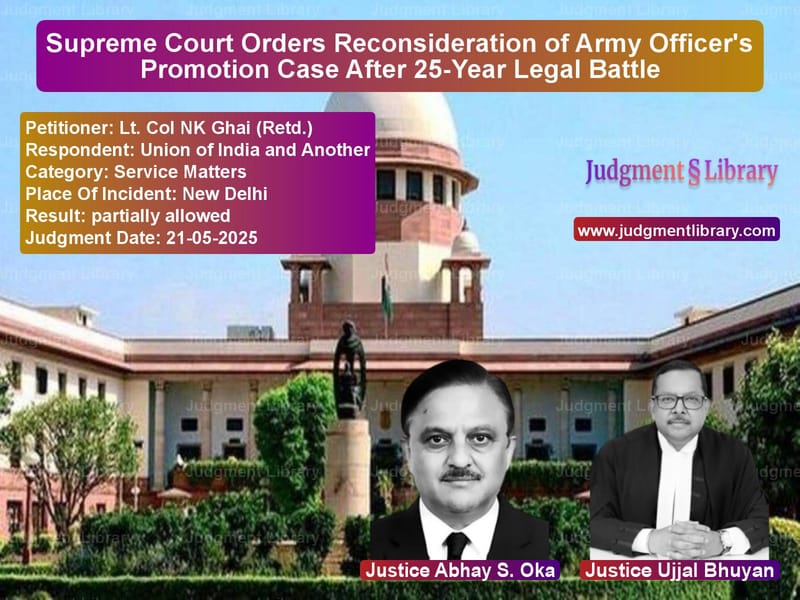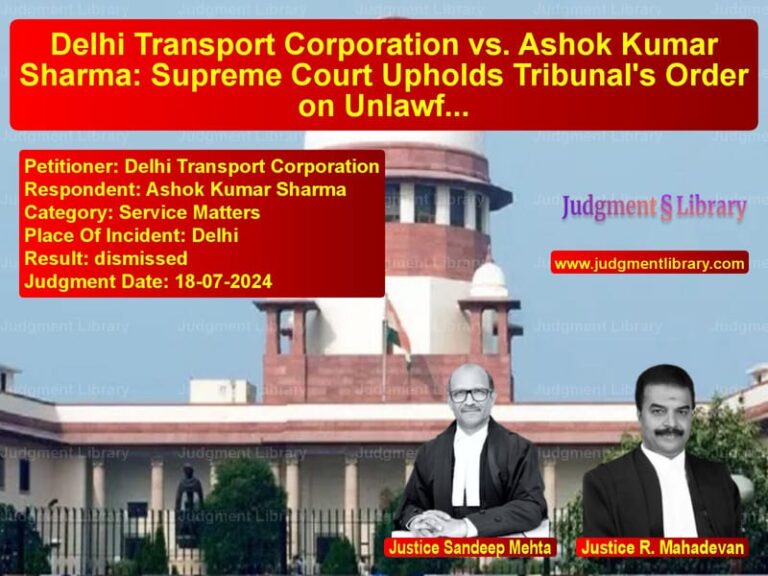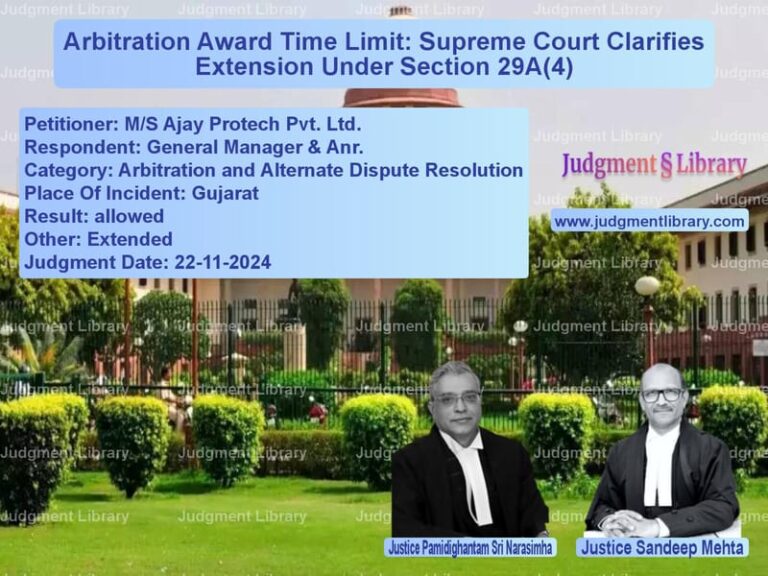Supreme Court Orders Reconsideration of Army Officer’s Promotion Case After 25-Year Legal Battle
The pursuit of justice can be a long and arduous journey, especially when it involves challenging the decisions of powerful institutions like the military. For Lt. Col NK Ghai (Retd.), this journey spanned nearly a quarter century, taking him through multiple complaints, court proceedings, and ultimately to the highest court of the land. His story represents not just a personal struggle for career advancement, but a broader examination of how promotion systems function within India’s armed forces and the role of judiciary in ensuring fairness in administrative decisions.
The case that reached the Supreme Court in 2025 had its origins in 1978, when Ghai was commissioned into the Territorial Army. Over the years, he progressed through the ranks, becoming a Time Scale Major in 1991 and a Selection Grade Lieutenant Colonel in 1996. However, his career trajectory hit a roadblock when he was considered for promotion to Colonel on five separate occasions between 2000 and 2003, but failed to make the cut each time. This repeated rejection set in motion a legal battle that would outlast his military career and test the limits of judicial review in service matters.
The Long Road to Supreme Court
Ghai’s legal journey began with a series of statutory and non-statutory complaints filed through military channels. He challenged his Annual Confidential Reports (ACRs), particularly the 1998 ACR where he initially found some success when the GOC-in-C, Northern Command granted him redress. However, subsequent complaints against non-empanelment for promotion met with rejection. His non-statutory complaint against non-empanelment for promotion to Colonel in July 2000 was treated as “null and void,” while his statutory complaint against non-empanelment in January 2000 was formally rejected.
Read also: https://judgmentlibrary.com/supreme-court-upholds-teachers-appointment-in-caste-category-dispute/
Frustrated with the internal grievance mechanisms, Ghai approached the Delhi High Court in 2006 through a writ petition. The High Court directed the respondents to dispose of his statutory complaint by a reasoned order, which led to a detailed speaking order rejecting his complaint on April 28, 2006. Challenging this order, Ghai filed another writ petition that was later transferred to the Armed Forces Tribunal, the specialized judicial body established to adjudicate service matters of armed forces personnel.
Before the Tribunal, Ghai made several prayers that went beyond just seeking promotion. He asked the court to promote him retrospectively to Colonel from March 14, 2000, and to Brigadier from March 14, 2003, with all consequential benefits. He sought validation of certain communications regarding his ACRs, challenged the validity of a reproof issued to him in 1999, requested the court to lay down promotion criteria for Territorial Army officers, and even called for a high-level enquiry into how another officer (respondent No. 2) was re-commissioned and promoted. These extensive prayers indicated the depth of his grievances and his belief that systemic issues needed addressing beyond his individual case.
The Tribunal, however, found no error in the decision not to place Ghai in an acceptable grade for promotion to Colonel and dismissed his petition on November 2, 2017. This rejection led to the final leg of his legal journey – an appeal to the Supreme Court of India.
Arguments Before the Supreme Court
When the matter came before the Supreme Court bench comprising Justice Abhay S. Oka and Justice Ujjal Bhuyan, Ghai chose to argue his case in person—a challenging task for any litigant, especially when facing the legal might of the Union of India represented by the Additional Solicitor General.
Ghai, appearing in person, presented his case with the detailed knowledge of someone who had lived with the matter for decades. He submitted that “he has been victimized and denied promotion to the post of Colonel.” He pointed to his service record, arguing that “all along, his ACRs have been above average or near excellent.” This assertion was crucial to his case, as it suggested that his repeated non-selection for promotion was inconsistent with his performance evaluations.
The retired officer relied heavily on the Territorial Army Regulations, 1948, particularly Clause (c) of Paragraph 38, which states that “Territorial Army officers will be eligible for promotion by selection to the substantive rank of Colonel against specific vacancies after completion of 22 years of service.” Having completed the requisite service period, Ghai argued that he met the basic eligibility criteria for promotion consideration.
Ghai specifically pointed to the No. 3 Selection Board meeting held in June 2000, where his case for promotion was rejected. He highlighted that his statutory complaint against this rejection led to an Army Headquarters reply indicating that “the result of the No. 3 Selection Board has been nullified for certain reasons.” This nullification, in his view, created an opportunity for his case to be reconsidered, but this never happened.
Perhaps the most significant part of Ghai’s argument centered on what he perceived as preferential treatment given to respondent No. 2. His submission was that “a favour was done to respondent No. 2 while granting promotion.” Based on this, he contended that “the case of the appellant for promotion must be reconsidered,” essentially arguing for equal treatment.
The Union of India, represented by the Additional Solicitor General, mounted a robust defense of the military’s promotion process. The ASG referred to Paragraph 108(d) of Defence Services Regulations for the Army, 1987, which explicitly provides that “the competent authority may differ from the recommendations of the Selection Board.” This provision was central to the respondents’ case, as it established the legal framework within which the promotion decisions were made.
The ASG acknowledged that “respondent No. 2 was not recommended for promotion by the No. 3 Selection Board (Colonel Rank) held in June 2001.” However, she emphasized that “in terms of Paragraph 108 of DSR, the competent authority empanelled respondent No. 2.” She further explained that “as provided in Paragraph 108(d) of DSR, the assessment of Selection Board is recommendatory in nature and becomes binding only after it is approved by the competent authority i.e. Chief of Army Staff.”
To bolster this argument, the ASG pointed to clause (e) of Paragraph 108 of DSR, which “provides that the Central Government or the COAS has the inherent power to modify, review, approve with variations, or repeal the recommendations of the Selection Boards.” Based on these regulations, she asserted that “the consideration of the case of respondent No. 2 was in terms of the policy.”
The most compelling evidence presented by the ASG came in the form of confidential selection board proceedings, which were submitted to the Court in a sealed envelope. These documents revealed that across all five selection processes between July 2000 and February 2003, “the gradation of the appellant was ‘Z’.” In the military promotion system, ‘Z’ grading means “unfit for promotion to the next higher rank at present.” This consistent grading across multiple selection boards significantly undermined Ghai’s claim of being a high-performing officer unfairly denied promotion.
The Court’s Deliberation and Findings
The Supreme Court bench carefully examined the arguments and documents presented by both sides. The justices noted that “we have considered the arguments and perused the documents on record.” Their examination of the confidential proceedings revealed “that an elaborate selection process was conducted” by the No. 3 Selection Board.
The Court’s analysis of the selection board records showed a detailed picture of Ghai’s promotion considerations. In the July 2000 proceedings, “the appellant’s case was considered along with respondent No. 2 and Lt. Colonel A. Singh.” While respondent No. 2’s name was deferred in this round, the June 2001 process proved more decisive. The Court recorded that “in the June 2001 process, there were three candidates, including the appellant, respondent No. 2, and Col. N.K.V. Narayanan. Grading ‘B’ was given to respondent No. 2 and Col. N. K. V. Narayanan, which means they were found fit for promotion to the next higher rank. However, the appellant was given grading ‘Z’ and therefore, the appellant was not eligible.”
This pattern continued in subsequent selection processes. The Court found that “in the subsequent process of December, 2001, the appellant was given grading ‘Z’ and hence, he was held to be ineligible. Similarly, we find from the proceedings of No. 3 Selection Board held in June 2002 and February 2003 that the appellant was given grading ‘Z’.”
However, the Court identified a crucial irregularity that would become the basis for its intervention. Examining the June 2001 selection board records, the justices noted that “it is mentioned in the record that grading of ‘Z’ was given to respondent No. 2. The grading of respondent No. 2 has been altered by the COAS by converting ‘Z’ into ‘B’.”
This intervention by the Chief of Army Staff, while permitted under the Defence Services Regulations, created an inequality in treatment that troubled the Court. The justices observed that “according to the DSR, the final authority for granting promotions is the COAS. We find that in the case of respondent No. 2, the COAS reconsidered his case. However, that was not done in the case of the appellant.”
This differential treatment formed the core of the Court’s reasoning. The bench stated clearly: “In our view, as the COAS has reconsidered the case of respondent No. 2, the case of the appellant for upgradation ought to have been considered.”
The Court’s Directive and Its Implications
Based on its finding of unequal treatment, the Supreme Court issued a specific directive: “Hence, we direct reconsideration of the grading given to the appellant in the selection process of June 2001.” The Court limited its intervention to this specific aspect, noting that “no other modification can be made to the impugned Judgment.”
The Court elaborated on the nature of this reconsideration: “We direct that in the selection process of June 2001, the case of the appellant for upgradation from category ‘Z’ shall be considered by the COAS.” Recognizing the protracted nature of the litigation, the bench set a strict timeline, ordering that “an appropriate decision shall be taken within a period of three months from today.”
The Court also addressed the potential consequences of a favorable reconsideration: “Needless to add that if, ultimately, grading ‘Z’ is upgraded, the case of the appellant for grant of notional promotion shall be considered along with consequential benefits.” This direction acknowledged that even if Ghai’s grading were to be improved, he could only receive notional promotion at this late stage, given his retirement.
Ultimately, the Court “partly allowed” the appeal, providing Ghai with a limited but significant victory after years of litigation. The wording “partly allowed” reflected the Court’s careful balancing act – acknowledging the procedural irregularity in Ghai’s case while largely upholding the military’s promotion system and the Armed Forces Tribunal’s decision.
Broader Significance of the Judgment
This Supreme Court judgment represents an important precedent in the intersection of military administration and judicial review. The Court demonstrated respect for the autonomy of military promotion processes while asserting its authority to intervene when procedural fairness is compromised.
The decision reaffirms that while courts generally defer to the specialized knowledge and discretion of military authorities in promotion matters, they will step in when there is evidence of arbitrary or discriminatory treatment. The principle that similarly situated officers should receive similar consideration is fundamental to administrative law, and the Court found that this principle had been violated in Ghai’s case.
The judgment also highlights the challenges faced by military personnel in challenging promotion decisions. Ghai’s journey through multiple complaints, statutory appeals, and three levels of judicial review over nearly 25 years illustrates the enormous personal commitment required to pursue such cases. That he ultimately achieved only a limited reconsideration rather than the promotion he sought speaks to the high threshold for successful challenges to military promotion decisions.
For serving and retired military personnel, the judgment serves as both encouragement and caution. It demonstrates that judicial recourse is available when procedural irregularities occur, but also that courts will generally not substitute their judgment for that of military authorities on substantive promotion decisions. The case emphasizes the importance of consistency and transparency in administrative decision-making, even within hierarchical institutions like the military.
As Ghai’s long legal battle reaches its conclusion, the directive for reconsideration of his June 2001 grading represents a final opportunity for vindication. Whether this leads to the notional promotion he sought remains to be seen, but the Supreme Court’s intervention has at least ensured that his case will receive one more look from the highest military authority, with the instruction to apply the same consideration that was given to his colleague over two decades earlier.
Petitioner Name: Lt. Col NK Ghai (Retd.).Respondent Name: Union of India and Another.Judgment By: Justice Abhay S. Oka, Justice Ujjal Bhuyan.Place Of Incident: New Delhi.Judgment Date: 21-05-2025.Result: partially allowed.
Don’t miss out on the full details! Download the complete judgment in PDF format below and gain valuable insights instantly!
Download Judgment: lt.-col-nk-ghai-(ret-vs-union-of-india-and-a-supreme-court-of-india-judgment-dated-21-05-2025.pdf
Directly Download Judgment: Directly download this Judgment
See all petitions in Promotion Cases
See all petitions in Employment Disputes
See all petitions in Public Sector Employees
See all petitions in Judgment by Abhay S. Oka
See all petitions in Judgment by Ujjal Bhuyan
See all petitions in partially allowed
See all petitions in supreme court of India judgments May 2025
See all petitions in 2025 judgments
See all posts in Service Matters Category
See all allowed petitions in Service Matters Category
See all Dismissed petitions in Service Matters Category
See all partially allowed petitions in Service Matters Category







